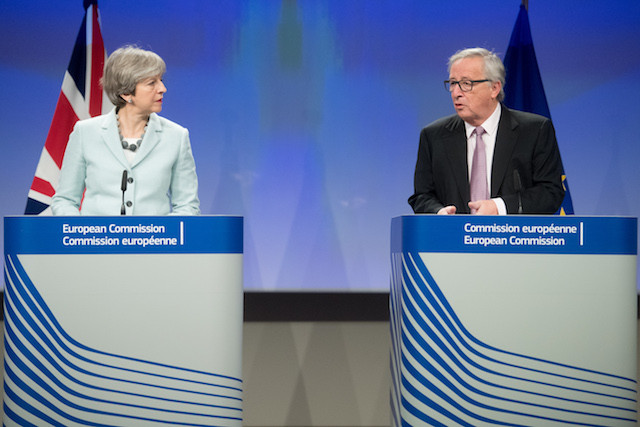The agreement that was hashed out over the past week on the three divorce issues (financial settlement, citizens’ rights and the border between Northern Ireland and Ireland) shows the strength of the EU’s hand in this round.
Citizens’ rights
The rights on family reunification, for frontier workers, and on social security have all been based on reciprocity, contrary to what the initial UK paper on citizens’ rights proposed.
People who acquired permanent residence under the withdrawal agreement can be absent from the territory for a period of less than 5 consecutive years without losing their residence right—contrary to the UK proposal of 2 years.
Residence permits
Both the UK and the EU27 can choose to set up a residence permit system, which the UK has already announced it will do.
John Marshall, the British ambassador to Luxembourg, told Delano that:
“It remains to be seen whether individual member states want to take such an approach. I will be finding out in due course what approach the Luxembourg government plans to take. But any member state that decides on the constitutive approach will be required to ensure that it is a simple and straightforward system, in the same way as ours will be.”
Paragraph 22 also sets out that the UK and EU27 can apply more favourable national provisions.
Equal treatment will apply on rights of workers, self-employed, students and economically inactive citizens.
ECJ
The UK courts will have due regard to relevant decisions of the European court of justice, and on case-law can seize the ECJ with questions of interpretation. This mechanism, which will be detailed in the withdrawal agreement, will be available for 8 years.
A national authority will be created in the UK to act on citizens’ complaints.
Brill: we still face uncertainty
However, Fiona Godfrey, the head of the advocacy group Brill, has said that they were “bitterly disappointed with what the European Commission and the British government have agreed on free movement.”
She added that:
“At the moment, it would appear that British citizens living in the EU 27 have been landlocked in their member state of residence. (…) We don’t have free movement. There is some discussion as to whether it will be discussed next year in phase 2, but we have absolutely no certainty that it will be.”
Godfrey, who is also vice-chair of Britains in Europe, explained that some member states may apply more stringent procedures than others:
“We hope that Luxembourg would be one of the countries that accepts a declaratory status and doesn’t make us reapply. But in some EU countries, that is going to be a problem for UK nationals.”
In the technical note covering citizens’ rights, it has been noted that several issues were raised by the UK which were outside the scope of the EU mandate for the first phase of negotiations. These issues were:
- the continuing protection of rights for UK nationals covered by the withdrawal agreement who move after the specified date to take up residence in another member state;
- posted workers;
- future healthcare arrangements;
- professional qualifications–future recognition decisions, recognition of qualifications of non-residents, and equal treatment for professionals who are neither frontier workers nor resident;
- recognition of licences and certificates that are currently recognised EU-wide
- lawyers practising under home title; and
- territorial scope of economic rights, in particular secondary establishment and cross-border provision of services.
Godfrey said:
“We’re hugely concerned about the issue of professional qualifications because that is not covered under the sufficient progress agreement. A lot of us will have problems with that. It may be discussed in phase 2 next year, but it may be another issue which may fall outside the withdrawal agreement completely. So we have no certainty that our qualifications will be recognised. But if you were lucky enough to exercise your free movement rights, you wouldn’t be able to take your qualifications with you as the agreement currently stands. Even if we were to get free movement, we might not be able to take up a job in another member state. We’re also coming to that point where our economic rights appear not to fall under the withdrawal agreement at all and are unlikely to be discussed until the withdrawal agreement is being finalised. The rights to supply cross-border services for example will move our livelihoods either at Brexit day or at the end of the transition period.”
